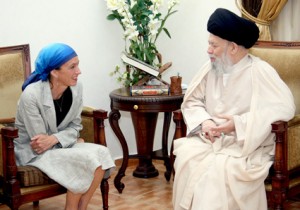
Britain’s ambassador to Lebanon said she regretted any offence caused by her blog praising Grand Ayatollah Mohammed Hussein Fadlallah, an early spiritual mentor of Hezbollah who died on Sunday.
Ambassador Frances Guy ( pictured in a file photo with Fadlallah) was criticized by Israel for an article on her Foreign Office blog titled “The passing of decent men,” in which she said she was saddened by the Shi’ite cleric’s death and that the world “needs more men like him willing to reach out across faiths.”
The Foreign Office said on Friday the article had been removed from her website “after mature consideration.”
Fadlallah was revered by many Shi’ite Muslims across the Middle East and Central Asia, and was known in his later years for his moderate social views and for trying to minimize Muslim sectarian differences.
He was designated a terrorist by the United States and Israel because of his links to militant Shi’ite group Hezbollah and his support for suicide attacks against the Jewish state.
In a new entry, dated July 9, Guy said her earlier posting had been an attempt to “acknowledge the spiritual significance to many of Sheikh Fadlallah and the views that he held in the latter part of his life.”
Guy said she had “no truck with terrorism wherever it is committed in whoever’s name,” and that it was possible for Hezbollah “to reject violence and play a constructive, democratic and peaceful role in Lebanese politics.”
The criticism of her blog followed the firing of a senior CNN editor for Middle East news who published a Twitter message expressing her respect for Fadlallah.
Hundreds of thousands of mourners attended Fadlallah’s funeral in Beirut. Iraq’s U.S.-backed Prime Minister Nuri al-Maliki, and his two predecessors, all flew to Lebanon to pay condolences to the cleric who was born and studied in Iraq and was one of the first backers of Maliki’s Dawa Party.
Fadlallah was also seen as the spiritual leader and mentor of Hezbollah when it was formed after Israel invaded Lebanon in 1982, though he later distanced himself from its ties with Iran.
The Iranian-backed Hezbollah was blamed for abduction of Westerners in the 1980s and suicide attacks on U.S. and French targets in Lebanon. Reuters

Leave a Reply
You must be logged in to post a comment.